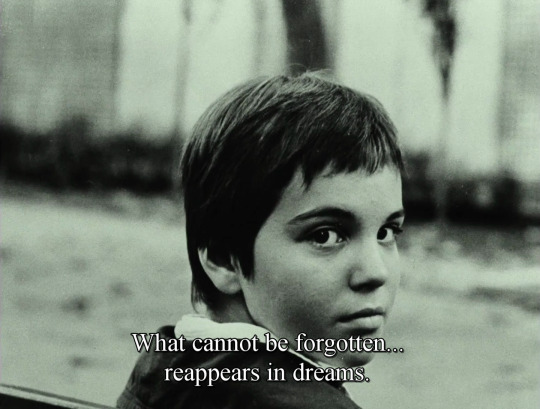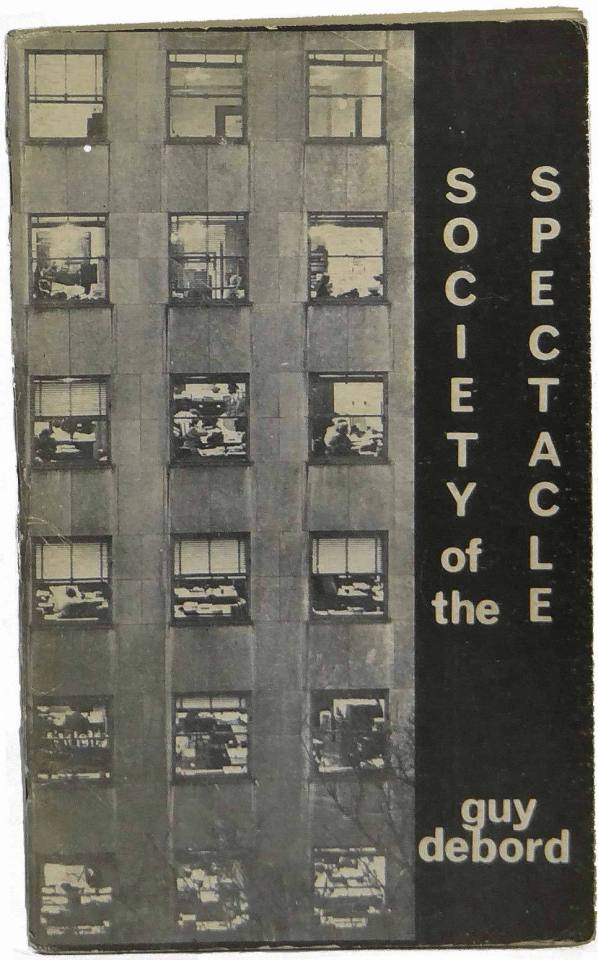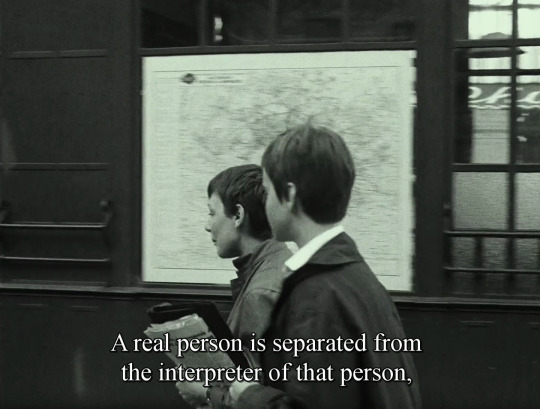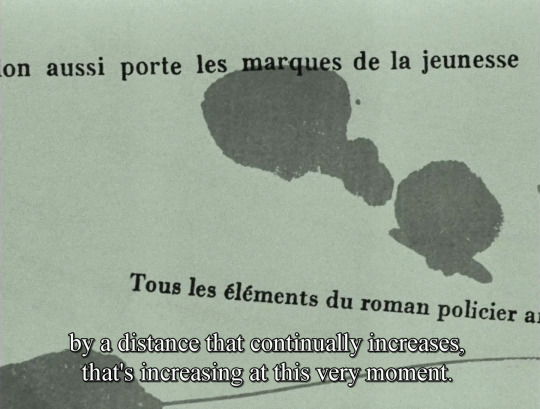#Guy DeBord
Explore tagged Tumblr posts
Text

Critique of Separation (1961), dir. Guy Debord
31 notes
·
View notes
Text
on the topic of trains and the role of technology in ongoing atrocities, i think something to consider if this is shocking to you is that the development of all technology since the start of the industrial revolution (and a lot of it before that tbh) has been dictated by the needs of capital. trains wouldn't exist without the reign of an economic system that demands mass circulation of commodities. the world has not been shaped by what's best for everyone but what's best for perpetuating that economic system. as Debord says about media technology, "it should be understood that this apparatus is in no way neutral and that it has been developed in accordance with the spectacle’s internal dynamics" (The Society of the Spectacle, thesis 24).
735 notes
·
View notes
Text

Critique de la Séparation (Guy Debord, 1961)
#Critique de la Séparation#Critique de la Separation#Guy Debord#Debord#short film#1961#Critique of Separation#quote#Caroline Rittener#black and white#dream#dreams#memory
2K notes
·
View notes
Quote
Paradoxically, permanent self-denial is the price the individual pays for the tiniest bit of social status. Such an existence demands a fluid fidelity, a succession of continually disappointing commitments to false products. It is a matter of running hard to keep up with the inflation of devalued signs of life. Drugs help one to come to terms with this state of affairs, while madness allows one to escape from it.
Guy Debord, Comments on the Society of the Spectacle
#self#other#fame#popularity#desires#fears#quotes#Debord#Guy Debord#Comments on the Society of the Spectacle
175 notes
·
View notes
Text

“The spectacle is the bad dream of a modern society in chains and ultimately expresses nothing more than its wish for sleep. The spectacle is the guardian of that sleep.”
Guy Debord quote seen at Swartz Bay Ferry Terminal, BC, Canada
200 notes
·
View notes
Text
''The government of the spectacle, which now possesses all the means to falsify the whole of production and perception, is the absolute master of memories just as it is the unfettered master of projects that will shape the most distant future. It reigns unchecked; it executes its summary judgments''.

30 notes
·
View notes
Text

Spectacle
Issue #15 of Cover. Download here.
Older issues available here.
20 notes
·
View notes
Text

Guy Debord, Contre Le Cinéma, 1964
31 notes
·
View notes
Text
“Obscenity begins when there is no more spectacle, no more stage, no more theatre, no more illusions, when everything becomes immediately transparent, visible, exposed in the raw and inexorable light of information and communication.”
Jean Baudrillard, The Ecstasy of Communication
#jean baudrillard#baudrillard#guy debord#debord#philosophy#postmodernism#spectacle#simulation#simulacra#hyperreality#sociology#technology
14 notes
·
View notes
Text

Guy Debord - Society of the spectacle
47 notes
·
View notes
Text
The End of the World or the End of Capitalism?: Colletion of Notes.
>"Capitalist realism as I understand it cannot be confined to art or to the quasi-propagandistic way in which advertising functions. It is more like a pervasive atmosphere, conditioning not only the production of culture but also the regulation of work and education, and acting as a kind of invisible barrier constraining thought and action". -Mark Fisher, Capitalist Realism: Is There No Alternative? >[Capital] has drowned the most heavenly ecstasies of religious fervor, of chivalrous enthusiasm, of philistine sentimentalism, in the icy water of egotistical calculation. It has resolved personal worth into exchange value, and in place of the numberless indefeasible chartered freedoms, has set up that single, unconscionable freedom Free Trade. In one word, for exploitation, veiled by religious and political illusions, it has substituted naked, shameless, direct, brutal exploitation -Karl Marx and Friedrich Engels, Manifest der Kommunistischen Partei.
>"In his Prison Notebooks, Gramsci said that in periods of crisis the old is dying and the new is not yet born. While Gramsci drew attention to the morbid symptoms of such a situation (in 1930) our crisis is different, and I want to draw attention to more hopeful symptoms (waiting to be born) of our present crisis of capitalist hegemony. The viability of initiatives trying to avoid competition with the market and escape from the hierarchic state rests on many untested assumptions. The first assumption is that those who do essential day-to-day tasks would continue to do their jobs in a PCC in preference to large corporations and their local affiliates: a multitude of people who now work in private or public sectors, directly or indirectly, establishing PCCs in their local communities producing food, organizing transport, setting up places of learning and transmission of skills, providing healthcare, running power systems, and so on. PCCs already do this all over the world on a small scale but such initiatives struggle within capitalist markets. Community-Supported Agriculture schemes in various parts of the world represent a first step on a long and difficult road to self-sufficiency in this sphere". - Leslie Sklair, The End of the World or the End of Capitalism? >"In 1869, New York neurologist George Beard used the term "neurasthenia" to describe a very broad condition caused by the exhaustion of the nervous system, which was thought to be particularly found in "civilized, intellectual communities." In 1998, Swedish psychiatrists Marie Åsberg and Åke Nygren investigated a surge of depression health insurance claims in Sweden. They found that the symptoms of many cases did not match the typical presentation of depression. Complaints like fatigue and decreased cognitive ability dominated, and many believed their working conditions to be the cause" >"The whole life of those societies in which modern conditions of production prevail presents itself as an immense accumulation of spectacles. All that once was directly lived has become mere representation". -Guy Debord, The Society of the Spectacle. >"Architecture is the simplest means of articulating time and space, of modulating reality, of engendering dreams. It is a matter not only of plastic articulation and modulation expressing an ephemeral beauty, but of a modulation producing influences in accordance with the eternal spectrum of human desires and the progress in realizing them. The architecture of tomorrow will be a means of modifying present conceptions of time and space. It will be a means of knowledge and a means of action." -Ivan Chtcheglov, Formulary for a New Urbanism
>"To you, this gathering is just one more boring event. The Situationist International, however, considers that while this assemblage of so many art critics as an attraction of the Brussels Fair is laughable, it is also significant.
Inasmuch as modern cultural thought has proved itself completely stagnant for over twenty-five years, and inasmuch as a whole era that has understood nothing and changed nothing is now becoming aware of its failure, its spokesmen are striving to transform their activities into institutions. They thus solicit official recognition from the completely outmoded but still materially dominant society, for which most of them have been loyal watchdogs.
The main shortcoming of modern art criticism is that it has never looked at the culture as a whole nor at the conditions of an experimental movement that is perpetually superseding it. At this point in time the increased domination of nature permits and necessitates the use of superior powers in the construction of life." -The Situationist International, Action in Belgium Against the International Assembly of Art Critics >"Karoshi (Japanese: 過労死, Hepburn: Karōshi), which can be translated into "overwork death", is a Japanese term relating to occupation-related sudden death.
The most common medical causes of karoshi deaths are heart attacks and strokes due to stress and malnourishment or fasting. Mental stress from the workplace can also cause workers to commit suicide in a phenomenon known as karōjisatsu (過労自殺)" >"The limits of capitalism are not fixed by fiat, but defined (and redefined) pragmatically and improvisationally. This makes capitalism very much like the Thing in John Carpenter's film of the same name: a monstrous, infinitely plastic entity, capable of metabolizing and absorbing anything with which it comes into contact. Capital, Deleuze and Guattari says, is a ‘motley painting of everything that ever was'; a strange hybrid of the ultra-modern and the archaic. In the years since Deleuze and Guattari wrote the two volumes of their Capitalism And Schizophrenia, it has seemed as if the deterritorializing impulses of capitalism have been confined to finance, leaving culture presided over by the forces of reterritorialization.
This malaise, the feeling that there is nothing new, is itself nothing new of course. We find ourselves at the notorious ‘end of history' trumpeted by Francis Fukuyama after the fall of the Berlin Wall. Fukuyama's thesis that history has climaxed with liberal capitalism may have been widely derided, but it is accepted, even assumed, at the level of the cultural unconscious. It should be remembered, though, that even when Fukuyama advanced it, the idea that history had reached a ‘terminal beach' was not merely triumphalist. Fukuyama warned that his radiant city would be haunted, but he thought its specters would be Nietzschean rather than Marxian. Some of Nietzsche's most prescient pages are those in which he describes the ‘oversaturation of an age with history'. ‘It leads an age into a dangerous mood of irony in regard to itself, he wrote in Untimely Meditations, ‘and subsequently into the even more dangerous mood of cynicism', in which ‘cosmopolitan fingering', a detached spectatorialism, replaces engagement and involvement. This is the condition of Nietzsche's Last Man, who has seen everything, but is decadently enfeebled precisely by this excess of (self) awareness." -Mark Fisher, Capitalist Realism: Is There No Alternative?
>The Socialist Patients' Collective (German: Sozialistisches Patientenkollektiv, and known as the SPK) is a patients' collective founded in Heidelberg, West Germany, in February 1970, by Wolfgang Huber (born 1935). The kernel of the SPK's ideological program is summated in the slogan, "Turn illness into a weapon", which is representative of an ethos that is continually and actively practiced under the new title, Patients' Front/Socialist Patients' Collective, PF/SPK(H). The first collective, SPK, declared its self-dissolution in July 1971 as a strategic withdrawal but in 1973 Huber proclaimed the continuity of SPK as Patients' Front.
The SPK assumes that illness exists as an undeniable fact and believe that it is caused by the capitalist system. The SPK promotes illness as the protest against capitalism and considers illness as the foundation on which to create the human species. The SPK is opposed to doctors, considering them to be the ruling class of capitalism and responsible for poisoning the human species. The most widely recognized text of the PF/SPK(H) is the communique, SPK – Turn illness into a weapon, which has prefaces by both the founder of the SPK, Wolfgang Huber, and Jean-Paul Sartre. Rejecting the roles and ideology associated with the notion of the revolutionary as scientific explainer, they stated in Turn Illness into a Weapon that whoever claims they want to "observe the bare facts dispassionately" is either an "idiot" or a "dangerous criminal."
#anti capitalism#leftblr#SPK#Mark Fisher#Leslie Sklair#the international situationist#guy debord#end of the world#postmodernism#postmodern#marxism#socialism#capitalism#Colletion of notes#Colletion of Notes#Collection of Notes
56 notes
·
View notes
Text

#communism#guy debord#situationist#marxism#society of the spectacle#situationism#situationist international#mao zedong#maoism
12 notes
·
View notes
Note
Do you think society of the spectacle is worth the read
kind of a funny thing to ask Girl Debord but yes! absolutely. if it's your first time reading theory, I recommend reading Fredy Perlman's essay The Reproduction of Daily Life first, as it introduces a lot of concepts that are important in Situationist thought in much simpler language. As for the text itself, I think the Knabb translation is very good, as well as the Nicholson-Smith translation, which is probably the easiest to find in print right now. A good companion read is Guy Debord by Anselm Jappe, which goes over Society of the Spectacle in the context of Debord's writing more broadly & does a lot to elucidate his influences & contributions.
don't be daunted by all these recommendations tho, it's not a super long text & it makes total sense to re-read passages a few times. all of the English translations I know of are fine, so any copy you can get your hands on should be okay! good luck!
67 notes
·
View notes
Text




Critique de la Séparation (Guy Debord, 1961)
#Critique de la Séparation#Critique de la Separation#Guy Debord#Debord#short film#1961#Critique of Separation#quote#black and white#time#philosophy
609 notes
·
View notes
Quote
Ideas improve. The meaning of words participates in the improvement. Plagiarism is necessary. Progress implies it. It embraces an author’s phrase, makes use of his expressions, erases a false idea, and replaces it with the right idea.
Guy Debord, Society of the Spectacle
#ideas#words#meaning#plagiarism#progress#creativity#art#quotes#Debord#Guy Debord#Society of the Spectacle
131 notes
·
View notes
